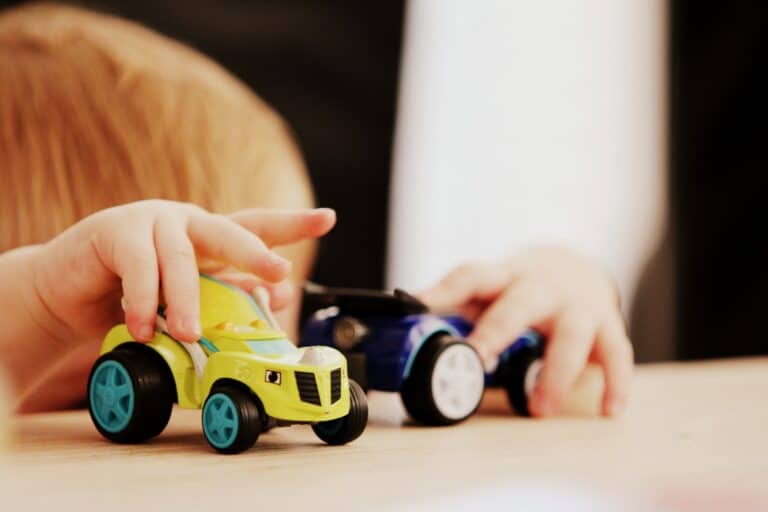Teaching children to share: FAQs
If I had a penny for every time I have been asked about teaching children to share, I would be a very rich parenting expert indeed! It is one of the first post-babyhood problems that parents of toddlers bump up against. 
So, teaching children to share definitely isn’t a one-off activity.
Here’s a quick summary of my most frequently asked questions about teaching children to share and a few tips to help you set off on the right track.
At what age can I expect my child to understand sharing?
‘Sharing’ is actually quite a complex idea. Adults often struggle to agree on what constitutes fair shares of things like time and money, so we can’t expect young children to get it right all the time. On its deepest level, sharing involves a high level of empathy and understanding how someone else might feel and that is something children gradually develop throughout their childhood.
One-year-olds tend to play alongside each other rather than jointly. They like to observe and take the lead from other children, which is why they will often want exactly the same toy another child is playing with. That makes sharing a bit of a challenge for them.
From around the age of two, we can expect children to start learning to take turns with toys. But this skill is only just developing so there are bound to be bumps and tears along the way.
From around three years old, children start to interact more and create joint games together, with increasingly complex rules. They start learning to negotiate sharing and need lots of opportunities to socialise to practise these new skills. But they also need close supervision for when those negotiation skills break down.
It’s not until children are at least four years old that they learn ‘perspective taking’ – that is imagining the world from someone else’s point of view. (See Toddlers’ brains: how toddlers think).
How can I teach my toddler to share?
First of all, just focus on teaching your young child to take turns. Play games with them that involve simple turn-taking (like throw and catch or Snap!) and praise them warmly for taking turns.
While you are playing, use words like ‘your turn’ / ‘my turn’ / ‘your turn’ / ‘my turn’ so they start to learn the words. Teach them a phrase to use (instead of snatching) if turn-taking breaks down – something like ‘It’s my turn now’ or ‘Can I have a turn’. Remember to praise them when they use their words.
Be patient. Sharing is a skill that has to be learnt and, just like learning to ride a bike, they will fall off quite a few times before they get it right. You might find it useful to look at these Books for teaching children social skills.
My little one has a tantrum if I make her share, what should I do?
Some days, sharing is just too hard. If children can’t take turns, remove the item that is causing problems for a few minutes (or remove the child from the game if it is only one child causing a problem). Ignore protests and tantrums or calmly acknowledge their feelings “I can see you are upset because you really wanted to play with that toy. But it’s time for the other children to have their turn now.” Try and engage them in another activity and try again later on the sharing lessons.
With older children and pre-schoolers, you might want to do some work on helping your child manage their big feelings – see this list of Books for talking to children about emotions for a good place to start.
What about siblings who hate having to share my attention?
Siblings often find it hard to share their parents’ time and attention and will fight to get a bigger slice of mummy or daddy. Try to make sure that each child gets some one-on-one time and don’t join in with the “It’s not fair!” game. Ignore attention seeking misbehaviour if you can. (See How to handle sibling rivalry).
Use ground rules to set some clear guidelines on how family members should co-operate and think about using family meetings to give everyone a chance to have their views heard.
And don’t forget to look after yourself. Constant bickering between siblings can tip the most saintly of us over the edge. It’s hard to be a calm, consistent parent when you are tired or stressed so find time to recharge regularly.
Good luck!







I think another thing to remember is that children are often expected to be more willing to share than adults. For example, a child brings a toy from home to the park, and another child wants to play with it. Well, if you were playing on a handheld game system (eg something made by Nintendo for example) and a stranger came up and said they wanted to play with it, how would you react? You might share if you feel trusting and generous towards them, but if they’re being demanding or you’re worried about losing your gaming device, or just not in the mood to share, you’d probably say no. And if they couldn’t accept that answer, most people would think they’re being unreasonable and entitled. So why would we have different rules for a toddler who brought something of theirs to the park?
This is a really good point! We often expect behaviour from children that we wouldn’t think is appropriate for adults. And adults can have very different views on what good sharing looks like!